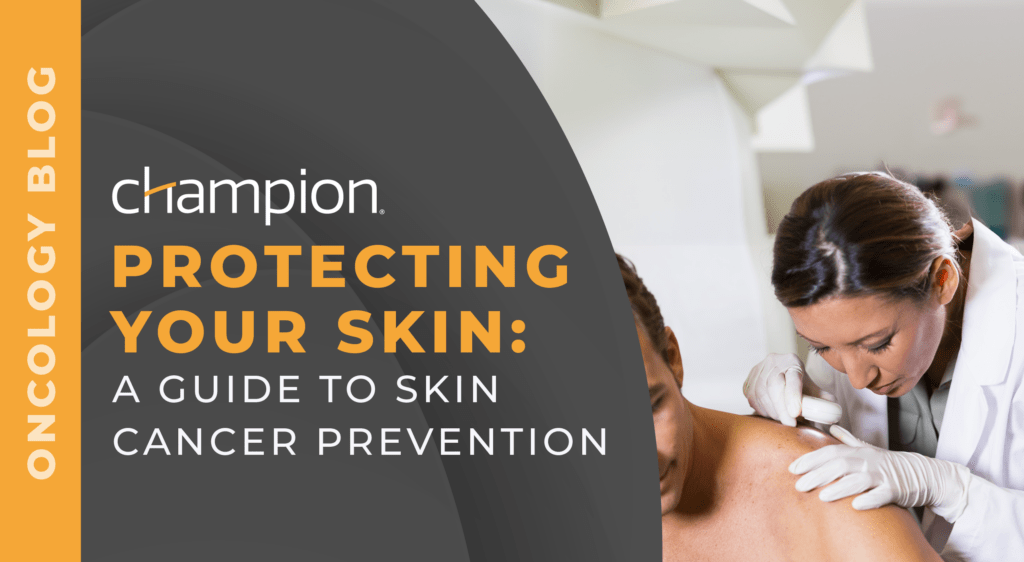
Protecting Your Skin: A Guide to Skin Cancer Prevention
To kick off June and get the summer started right, let’s pause and do a quick skin scan. Check your skin from head to toe. Look for anything new, changing, or unusual. If you find something, schedule an appointment with a dermatologist to have it examined or biopsied.
It’s important to raise awareness about skin cancer prevention, early detection, and treatment. To this end, various organizations and healthcare providers host events, offer free screenings, and distribute educational materials to promote sun safety and skin cancer awareness.
Several national groups are actively involved in skin cancer research, advocacy, and awareness efforts. The American Academy of Dermatology (AAD), the Skin Cancer Foundation, and the Melanoma Research Foundation are among the leading organizations working to combat skin cancer through education, research, and support services.
Skin cancer is one of the most common forms of cancer globally, affecting millions of people each year. With its prevalence on the rise, it’s crucial to understand how to prevent it and detect it early. This article explores the different types of skin cancer, prevention strategies, screening recommendations, diagnosis protocols, and treatment options.
Types of Skin Cancer
The most common types of skin cancer include basal cell carcinoma (BCC), squamous cell carcinoma (SCC), and melanoma. BCC and SCC typically develop in areas exposed to the sun, while melanoma can occur anywhere on the body, even in areas not exposed to sunlight.
BCC and SCC are highly treatable if detected early, with high cure rates through surgical removal. However, if left untreated, they can invade surrounding tissues and become disfiguring or even life-threatening.
Sign up to get the latest industry news and offers right in your inbox
Melanoma, although less common, is more likely to spread to other parts of the body and can be deadly if not treated promptly.
Read More: “Oncology Patients Face Challenges Other Patients Don’t”
![]()
Skin Cancer Prevention Strategies
While prevention strategies cannot guarantee complete immunity from skin cancer, they are crucial for minimizing risk factors and promoting overall skin health. Even individuals with a genetic predisposition to skin cancer or other risk factors can benefit from measures to lower their likelihood of developing the disease.
Here are a few prevention strategies that are practical and easy to follow:
- Sun Protection: Limiting exposure to ultraviolet (UV) radiation is key. Seek shade, especially during peak sunlight hours from 10 a.m. to 4 p.m.
- Wear Protective Clothing: Cover your skin with long sleeves, pants, wide-brimmed hats, and sunglasses to shield yourself from harmful UV rays.
- Apply Sunscreen: Use broad-spectrum sunscreen with an SPF of 30 or higher, and reapply every two hours or more frequently if swimming or sweating.
- Avoid Tanning Beds: UV radiation from tanning beds can increase the risk of skin cancer, so it’s best to avoid them altogether.
Is Age a Factor With Skin Cancer?
As for the age at which most people get skin cancer, it varies depending on the type of skin cancer. Basal cell carcinoma and squamous cell carcinoma are more common in older adults, typically occurring in individuals over the age of 50. However, these types of skin cancer can also affect younger individuals, especially those with significant sun exposure or other risk factors.
Although more frequently diagnosed in older adults, melanoma is one of the most common cancers among people in their 20s and 30s — and especially younger women.
While age can be a factor in the development of skin cancer, it’s essential for people of all ages to practice sun safety and engage in regular skin checks to detect any suspicious changes early on, regardless of their age or background. Early detection and prompt treatment significantly improve the prognosis for all types of skin cancer.
Skin Cancer Screenings, Diagnosis, and Treatment
It’s recommended that individuals perform monthly self-examinations of their skin to detect any changes or suspicious lesions. Additionally, you should schedule regular screenings with a dermatologist, especially if you have a family history of skin cancer or other risk factors.
Certain factors may predispose individuals to a higher risk of developing skin cancer, including fair skin, a history of sunburns, excessive sun exposure, a weakened immune system, and a family history of the disease.
Skin cancer is typically diagnosed through a skin biopsy, where a sample of the suspicious lesion is examined under a microscope. Treatment options vary depending on the type and stage of cancer but may include surgical removal, radiation therapy, chemotherapy, immunotherapy, or targeted therapy.
Read More: “Benefits of Modern Patient Seating for Oncology Treatments”
Skin Cancer Is Common — and Preventable
With over 5 million cases diagnosed in the United States each year, skin cancer is America’s most common cancer. Fortunately, skin cancer is also one of the most preventable cancers. By sharing facts about the dangers of unprotected sun exposure and encouraging people to check their skin for warning signs, lives can be saved.
Skin cancer prevention begins with sun protection and regular skin checks. Early detection and prompt treatment are crucial for a favorable prognosis. By following sun safety practices, staying vigilant about changes in your skin, and seeking professional medical care when needed, you can reduce your risk of developing skin cancer and promote overall skin health.
Remember, your skin is your body’s largest organ — take care of it.
Champion: Where Form Meets Function in Oncology Clinics
Keeping patients comfortable and safe during oncology treatments is crucial. At Champion, we ensure that healthcare professionals have the clinical access and ease of use they need, while creating a comforting and reassuring experience for the patient.
Read how our Alō medical recliners enhance patient comfort and ease of care for better treatment outcomes.
To view our entire portfolio of products, browse our digital catalog. Then, request a quote for your facility.
